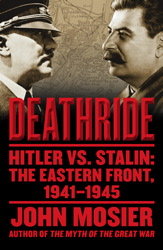 For some, the word “revisionist” is akin to a swear word. But the process of revision is essential to understanding the past; at their best, revisionist historians uncover new evidence while re-examining existing material from fresh perspectives. John Mosier, an English professor and film critic, has written three books on military history, including The Blitzkrieg Myth: How Hitler and the Allies Misread the Strategic Realities of World War II (2003); his work has earned him a certain reputation as a revisionist. But his latest book, Deathride, is fundamentally misconceived in ways likely to seriously mislead and misguide general readers. It is revisionism for the hell of it.
For some, the word “revisionist” is akin to a swear word. But the process of revision is essential to understanding the past; at their best, revisionist historians uncover new evidence while re-examining existing material from fresh perspectives. John Mosier, an English professor and film critic, has written three books on military history, including The Blitzkrieg Myth: How Hitler and the Allies Misread the Strategic Realities of World War II (2003); his work has earned him a certain reputation as a revisionist. But his latest book, Deathride, is fundamentally misconceived in ways likely to seriously mislead and misguide general readers. It is revisionism for the hell of it.
The book is constructed around a compound fallacy. First, it asserts that Stalin systematically falsified and concealed the evidence of his own incompetence as a war leader and a strategist. There is no question that until its implosion the Soviet regime systematically concealed and falsified data. But Mosier overstates Stalin’s incompetence, arguing that he culpably misjudged Hitler’s intentions, insisted on incessant attacks whatever their cost, bled Russia white, and created an army of “rapists and robbers…that staggered to victory on mountains of its own dead.” True, Stalin and the Red Army made horrendous mistakes. But they recovered, learned, and in the end created a formidable instrument of war that defeated the Wehrmacht, in good part on the Wehrmacht’s terms.
Second, Mosier argues Stalin created the “myth” that the USSR decided the war’s outcome, forging a legend of Germans killed and tanks destroyed based on doctored statistics that Western historians still accept as the truth. But the irony is that Stalin’s version of events is so obviously self-serving that it was largely dismissed after the war. History was left to the Germans, who for their own selfish reasons argued they had been overcome only by brute force.
Nor does Mosier shine when discussing particular operations. His assertion that there was a lull in fighting during the last three months of 1941 is a mind-boggling misinterpretation. The drive that brought the Germans to within sight of Moscow by December and the desperate Soviet counterattack that drove them back was hardly a lull. His statements that in 1943 the Germans were on the verge of “a genuine breakthrough,” and that Kursk did not fail but was willfully abandoned by Hitler, are so far from the mark that “wrong” doesn’t begin to describe it. Unfortunately, Deathride is shot through with similar declarations, based on tendentious sources or material cherry-picked from reliable works, then misapplied.
In effect, Mosier is serving up as fresh a long-existing, extremely familiar myth structured by Nazi generals, and thoroughly discredited by archival evidence from both sides. To support positions like these requires ignoring literally thousands of pages documenting and analyzing the erosion of German war-making capacity, and the Red Army’s recovery from Stalin’s purges and the first wave of the German invasion in 1941—its exponential development not only in strength but sophistication.
The Russians themselves, since the fall of the Soviet Union, have been recalculating Stalin’s data. Soviet archives, while certainly not entirely accessible, have provided ample evidence for reconstructing—indeed, revising—the history of the Russo-German War, entirely discrediting the notion that its outcome was determined solely by mass and attrition.
In short, Deathride offers an amateur’s self-confidence combined with a provocateur’s insouciance, while manifesting none of an aficionado’s insight. But the book is very well written and, on its surface, tells a plausible story. Odds are that it will impress some reviewers, perhaps some talk-show hosts. But sadly, this makes it a case study in what we can call Gresham’s Law of Historical Writing. Books like this give popular history the bad name it too often possesses in the academic world, and damage the synergy and trust between historians and the informed public—history’s most important audience.




